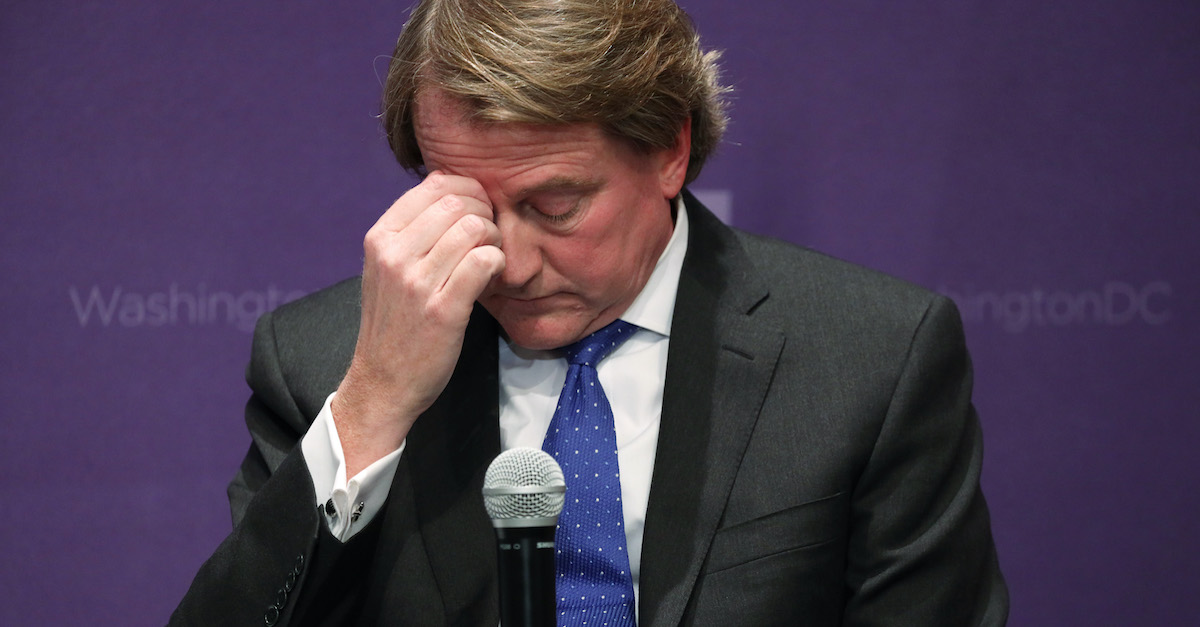
Here we go again. The U.S. Court of Appeals for the District of Columbia Circuit on Thursday agreed to re-re-litigate the never-ending battle between between the House Judiciary Committee and former White House counsel Don McGahn.
President Donald Trump’s onetime advisor is still fighting against the House’s long-ago-issued subpoenas sent during and related to the Democratic Party’s impeachment-and-removal effort.
Initially, the controversy was heard by a three-judge panel on the powerful appeals court. That first effort was disastrous for the House–with the GOP-judge dominated panel ruling that the U.S. House of Representatives cannot enforce its duly-authorized subpoenas against the executive branch using the judicial branch.
“The Department of Justice (DOJ), on behalf of McGahn, responds that Article III of the Constitution forbids federal courts from resolving this kind of interbranch information dispute,” two of the judges wrote in February. “We agree and dismiss this case.”
Premised on the idea that judicial interference in a spat between the two other official branches of the U.S. government was constitutionally untoward, legal experts criticized the decision as a “lawless” ruling that suggested a trend toward authoritarianism.
The full D.C. Circuit Court of Appeals then went on to overturn themselves and rehear the case en banc—a term imported from the French that means all the judges on any given “bench” or court.
Those self-vacating efforts were unanimously interpreted as a win for Democrats who hope to have McGahn’s testimony about his time in the White House—including an instance in which the 45th president allegedly ordered him to fire then-special counsel Robert Mueller.
In August, the full (en banc) panel ruled–in a 7-2 decision–that the House does, in fact, have the authority to use the courts as a method for subpoena enforcement. Later that same month, however, another panel of the same court ruled 2-1 that there is no statutory authority for Congress to enforce its own subpoenas whatsoever–setting up the second full en banc hearing in the weeks to come.
Technically the full court won’t hear the case–because Trump-appointed Circuit Judges Neomi Rao and Gregory Katsas have recused themselves from the case–and this puts the GOP at a decided disadvantage in a case that has become a hallmark and potential lodestar of executive power and privilege jurisprudence during the Trump era.
But aside from the many extant and important legal merits and facts of the case as it stands, the timing of the second en banc rehearing could prove fatal for the Democrats and their legal hopes to hold McGahn–really, the executive branch itself–accountable.
In the Democrats’ favor, the court has once again vacated its executive branch-deferential panel decision. But the oral arguments in the case are scheduled for well after the upcoming general election. Slated for late February 2021, the next president will have already been inaugurated by the time that the judges hear both sides’ arguments. The decision will likely come well after that–raising serious concerns over whether the case is even much of a controversy by the time it’s all said and done.
“As predicted, the full D.C. Circuit will rehear the controversial three-judge panel decision that the House lacks a cause of action to enforce its subpoenas—an issue that may in any event become moot on January 3 when Congress turns over,” noted University of Texas Law Professor Steve Vladeck via Twitter.
University of Iowa College of Law Professor Andy Grewal agreed.
“Interesting date,” he tweeted. “Arguably, the House subpoena will have expired by then and could no longer be enforced.”
To that end, the court is well-apprised of the linear/legal situation it has itself had a hand in making through the numerous hearings and re-hearings–along with the parties themselves.
The court directed both sides to brief the issue of whether or not the Judiciary Committee’s subpoena expires at the end of the current 116th Congress.
Read the full court’s order below:
House v. McGahn (En Banc Rehearing Order) by Law&Crime on Scribd
[image via Alex Wong/Getty Images]